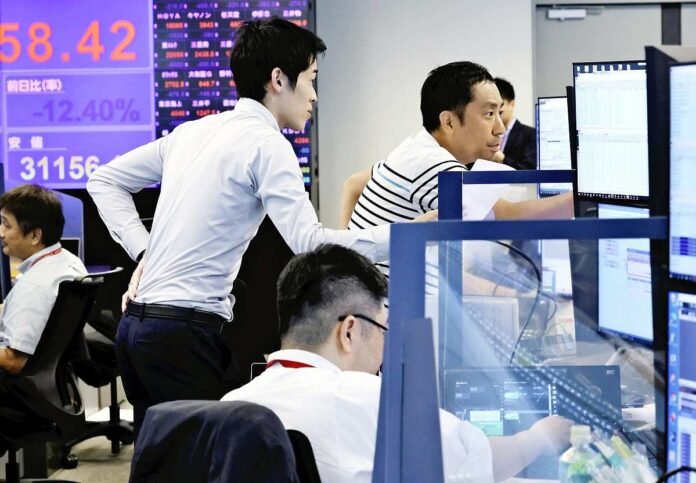Officials at a securities firm were confronted with a sharp drop in the Nikkei 225 index at the company’s trading room in Tokyo’s Chiyoda Ward on Monday afternoon.
18:02 JST, August 6, 2024
Tokyo’s stock market was shaken on Monday by a combination of concerns about a slowdown in the US economy, falling US stock prices and the rising yen.
The benchmark Nikkei 225 index fell 4,451 points, the biggest one-day loss in history and bigger than the drop on so-called Black Monday in 1987. Investors panicked and sold their holdings and the Nikkei index’s growth that had been going on since the start of the year evaporated.
“Someone yelled ‘Fire!’ in a crowded theater and everyone immediately fled,” said Shingo Ide, chief financial officer at the NLI Research Institute, explaining that Monday’s selling led to more selling because of investors’ group psychology.
Last week, the Nikkei index fell sharply, dropping 975 points on Thursday and 2,216 points on Friday. Including Monday’s loss, the Nikkei lost more than 7,600 points in three trading days.
Monday’s plunge was triggered by the release of disappointing U.S. July jobs data on Friday. Nonfarm payrolls came in significantly below market expectations, while the unemployment rate rose.
Many market participants expected the US economy to make a soft landing, with inflation easing without a serious economic slowdown. However, the latest US jobs figures apparently caused some investors to fear a hard landing and quickly sell their holdings. The Dow Jones Industrial Average closed down 610 points on Friday, its biggest drop of the year
On Monday, the fall in US stocks sent shockwaves around the world. All major Asian stock indices fell, with shares in South Korea and Taiwan down more than 8%. After the sharp fall in the Tokyo stock market, a major European stock index temporarily fell more than 3%.
Money invested in stocks has been shifted to government bonds, which are considered a relatively safe asset. Japanese and US government bond prices have risen, resulting in a plunge in long-term interest rates, which are inversely related to bond prices.
Tailwind turns into headwind
The Nikkei stock average has continued to rise since the beginning of this year, reaching its first record high in about 34 years in February. The index reached an all-time peak of 42,224 on July 11.
There were three tailwinds for Japanese stocks: (1) the strength of the U.S. stock market, with the Dow Jones Industrial Average and the Nasdaq Composite continuing to set new records; (2) the rally in semiconductor stocks, represented by Nvidia; and (3) the depreciation of the yen.
In particular, the weak Japanese currency, which was still below ¥150 per US dollar, made investors believe that Japanese stocks were undervalued, which attracted foreign investors.
But this tailwind suddenly turned into a strong headwind.
Weaker-than-expected U.S. jobs data sent U.S. stocks plummeting. While generative AI had fueled a dramatic rise in semiconductor stock prices, its profitability is now being questioned.
When the Bank of Japan decided to raise its short-term interest rate target in late July and the U.S. Federal Reserve is expected to cut interest rates in September, the yen rose rapidly against the U.S. dollar. On Monday, the Japanese currency temporarily rose by almost ¥8 compared to Friday. Under these circumstances, foreign investors no longer believe that Japanese stocks are undervalued.
The performance of Japanese companies operating abroad was partly supported by the strong US economy and the weak yen. Their stock prices, which had grown beyond their real value, quickly returned to their original levels.
Impact on consumption
“The US economy, which has been strong until now, is now showing signs of slowing down, and this has reversed the situation where the yen was weak against the US dollar and stock prices were high. Now the yen is rising and stock prices are falling,” said Masayuki Kubota of Rakuten Securities Economic Research Institute.
If the yen continues to rise and stock prices remain low, what will be the impact on the Japanese economy?
The strong yen often has a negative impact on the performance of exporting companies. According to SMBC Nikko Securities Inc., a ¥1 appreciation of the yen against the U.S. dollar reduces the operating income of large companies by 0.6%.
On the other hand, as the strong yen helps lower import costs and reduce inflation, households can expect a decline in long-term high prices.
This year, the new Nippon Individual Savings Account (NISA) program was launched and many individual investors have started investing in stock markets. If stock prices remain low, individuals’ assets may shrink, which may lead to lower consumption.
“The sharp drop in stock prices may cause investors to panic,” said Yusuke Shimoda, chief researcher at the Japan Research Institute Ltd. “But long-term accumulation is a basic element of wealth accumulation, so we can see the current situation as an opportunity to buy stocks at lower prices.”



